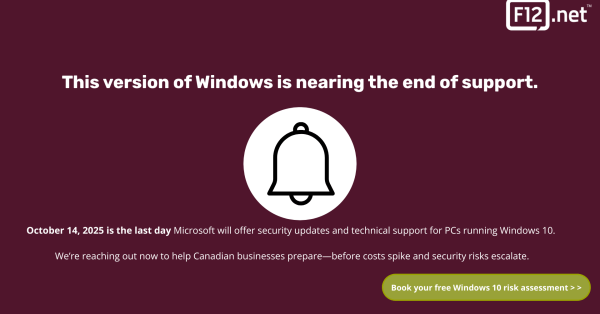Brief: Canadian organisations are facing a rising tide of cyber risk, insurance scrutiny, and regulatory requirements—especially in the wake of evolving threats and stricter compliance frameworks. This week, F12 hosted a live expert webinar unpacking the real-world impact of your cyber score on insurance eligibility, premiums, and business resilience. For those who missed the session, here’s what every Canadian mid-market leader needs to know.
“The future is already here—it’s just not evenly distributed.” —William Gibson, Canadian author
The Canadian Risk Reality—Beyond Technical Jargon
Let’s call it what it is: Cyber Security has moved from a technical side-project to a core business risk. We’ve entered an era where boards are asking pointed questions about incident response, regulators are dialling up expectations, and insurers are applying a far more critical lens to every application.
This isn’t a theoretical risk. It’s playing out in real time. At F12’s live session, we heard directly from leaders who’ve navigated tough renewals, rising deductibles, and even outright denial of coverage. What’s changed isn’t just the risk itself—it’s how that risk is measured and managed.
What is a Cyber Score—And Why Should You Care?
Think of your cyber score as the business world’s answer to a credit score. It’s not a marketing gimmick or a vendor buzzword—it’s the composite view that insurers, regulators, and yes, even your clients, are using to make decisions about who to trust, who to insure, and who to contract.
It’s built on real controls: Are you enforcing multi-factor authentication? Are your backups tested and isolated? Have you mapped your compliance to SOC 2, PIPEDA, or PHIPA if you’re in healthcare? These are the basics, not the wish list. And they’re no longer optional.
Compliance: No Longer a Checkbox Exercise
We’ve all heard the promises about “easy compliance.” The reality is, Canadian regulations are tightening—Bill C-26 is only the latest in a string of federal and provincial measures demanding evidence, not intent. Insurers now ask for specifics: documented policies, recent security assessments, and proof of real incident response planning.
At the webinar, we broke down actual claims data showing how compliance gaps translate into denied claims and expensive, drawn-out recovery processes. In 2024, the average cyber incident for a Canadian SMB topped $180,000—and that’s before accounting for lost business or reputational fallout (Coalition, 2025).
The Real Cost of Going Without Coverage
A question that landed with weight: “What actually happens if you don’t have cyber insurance?”
Here’s the bottom line: You’re taking on the full impact of any breach. That means ransom payments, legal fees, regulatory penalties, and, crucially, the cost of getting back online—alone. And if you’re in a regulated sector, losing insurance can mean losing contracts. It’s no longer enough to hope for the best.
Steps That Move the Needle
- Multi-factor authentication isn’t optional. If you don’t have it, expect higher premiums or limited coverage.
- Zero Trust is more than a buzzword. Lock down access. Verify users and devices. Shrink your attack surface.
- Continuous assessment is now standard. Pen tests, vulnerability scans, and documented remediation are must-haves, not nice-to-haves.
- Compliance documentation needs to be real, and recent. Have it on hand, mapped to the frameworks Canadian insurers actually reference.
- Incident response isn’t a policy—it’s a living plan. Test it, update it, and make sure everyone knows their role.
For Canadian Leaders, the Stakes Are High
This isn’t just about ticking boxes. Your cyber score is now as material to your business as your financials. Clients, insurers, and regulators are all watching. The upside? Every control you put in place, every audit you pass, translates directly to lower premiums, more reliable coverage, and the confidence to bid on bigger contracts.
Watch the Webinar Replay & Take Action
If you missed the live session, watch the full webinar replay here. We’re also offering a complimentary cyber score assessment for Canadian businesses—no strings attached. You’ll leave with a clear understanding of your strengths, your gaps, and what it will take to build genuine resilience.
Ready to get started? Book your assessment with F12 now.
Frequently Asked Questions
- Q: What exactly is a cyber score?
- A: It’s a composite measurement of your security controls, compliance maturity, and incident history, benchmarked against insurer and regulatory requirements.
- Q: How do insurers set pricing for Canadian businesses?
- A: They’re looking for evidence: policies, audit logs, controls. The stronger your posture, the lower your premiums.
- Q: What are the real risks if I can’t get insurance?
- A: You’re fully exposed—financially and operationally. You may also lose contracts or face compliance penalties.
- Q: Which frameworks matter most here in Canada?
- A: SOC 2, PIPEDA, PHIPA for healthcare, and GDPR for businesses serving EU customers. Insurers and clients want to see these mapped clearly.
- Q: How does F12 help?
- A: We close the gaps. From compliance readiness to incident response, we partner with you to ensure your business can withstand what’s coming—on your terms.


